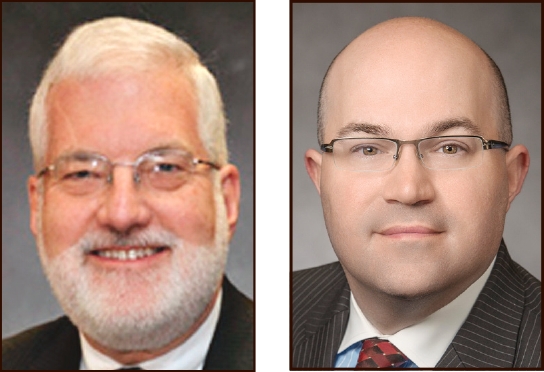Attorney's Column
An ‘Agreement to Agree’ Does Not Constitute An Enforceable Contract, Court Affirms
By THOMAS H. WELBY, P.E., ESQ. and GREGORY J. SPAUN, ESQ.

This column has often counseled that “if it’s not in writing, it didn’t happen.” While that is very simplified advice, the core lesson we seek to impart is that where an oral contract, or oral modification of a written contract, is permitted to happen, the facts are often relegated to a “he said, she said” dispute. Unfortunately, such disputes must ultimately be resolved by a jury (which, needless to say, is an expensive process—even if you win).
To avoid this eventuality, when negotiating contracts, many parties include “agreement to agree” provisions, which specifically negate the enforceability of anything other than a fully prepared and executed contract. As a court held in the recent case of Permasteelisa North America Corp. v JDS Construction Group, LLC, when such a provision is present, courts
will not find an enforceable agreement based on mere oral assertions, fragments of writings, or even handshakes.
Background
In mid- to late-2016, Permasteelisa North America and JDS Construction Group were in the process of negotiating for Permasteelisa to perform certain curtain wall and façade work on a construction project on DeKalb Avenue in Brooklyn, NY. Toward that end, the parties exchanged several proposals and discussed the scope of work and pricing. On March 30, 2017, JDS sent Permasteelisa a letter of award for the curtain wall scope of work. In the letter, however, Permasteelisa included a provision stating that “The parties expect to finalize the Subcontract on the project no later than April 30, 2017. Notwithstanding this Letter of Award, this letter does not bind either party to the performance of any obligation, or confer any rights, upon either party unless and until the parties actually execute the Subcontract.” In anticipation of entering into a nearly $50-million subcontract, Permasteelisa performed some preliminary work, which it claimed had a value of $1.9 million. The parties continued to negotiate a subcontract, with the scope and pricing changing several times. Ultimately, however, the parties never executed the anticipated subcontract.
When Permasteelisa was not paid for its claimed work, it filed, and ultimately commenced a lawsuit to foreclose a mechanic’s lien. This lawsuit also included claims for breach of contract, for unjust enrichment, and to recover on an account stated. After discovery, JDS moved to dismiss the lawsuit and discharge the mechanic’s lien, citing the “agreement to agree” provision in the award, and noting Permasteelisa’s deposition testimony conceding that a written subcontract was never executed. Permasteelisa opposed, conceding that the anticipated contract was never executed, but proffering what it termed was a “handshake agreement” to perform in anticipation of the execution of the contract.
Decision
The motion court granted JDS’s motion. In doing so, it cited to well settled law that there is a “strong presumption against finding a binding and enforceable obligation” where a proposed agreement contains an “agreement to agree” provision, and noted that JDS did nothing to lead Permasteelisa to believe that a contract had been entered into. Similarly, as to the unjust enrichment claim, the court held that without Permasteelisa having consented to the performance of the work, unjust enrichment was unavailable.
The court also cited case law holding that unjust enrichment “is not an appropriate remedy for recovery of the expenses of a failed negotiation.” Likewise, as to the account stated claim, such was similarly dismissed because such a claim “cannot be used to create liability where none otherwise exists.”
As to the mechanic’s lien, the court held that in the light of the dismissal of Permasteelisa’s other claims, the lien had to be discharged and the foreclosure claim dismissed. The court also addressed the willful exaggeration claim, holding that while the items which were the subject of the lien had no basis, they could not be said to have been willfully exaggerated as a matter of law sufficient for a summary disposition.
Comment
The first thing that comes to mind when one uses the term “oral contract” is a verbal conversation where one party says “do X for me, and I’ll pay you $Y,” and the other party agrees. However, another form of oral contract is the oral agreement supported by some written evidence of its terms (which may even be an unsigned version of a contract). The problem with this type of oral contract, similar to the truly verbal agreement, is the he said, she said nature of the dispute as to what is included, and what is not included, in the oral agreement. While the one party will rely on the confirmatory writings (or even the unsigned agreement), the other will undoubtedly claim that the writing or writings are not complete, and there is more to the agreement than those writings (which, again, must be proven with he said, she said testimony).
As the Permasteelisa Court reminds us, one way to avoid this eventuality is to use an “agreement to agree” clause, which will preclude either party from relying on anything less complete than the fully negotiated, signed contract. Contractors and others who are parties to construction contracts would be well advised to consult with experienced construction counsel to determine what provisions can be put into these contracts to clarify parties’ desires as to what is to be enforceable (and other subjects) so that courts do not ultimately err in setting forth what the parties may, or may not, have intended.
About the author: Thomas H. Welby, an attorney and licensed professional engineer, is General Counsel to the Construction Industry Council of Westchester & Hudson Valley, Inc., and is the Founder of and Senior Counsel to the law firm of Welby, Brady & Greenblatt, LLP, with offices located throughout the metropolitan region. Gregory J. Spaun, General Counsel to the Queens and Bronx Building Association and an attorney and partner with the firm, co-authors this series with Mr. Welby.
